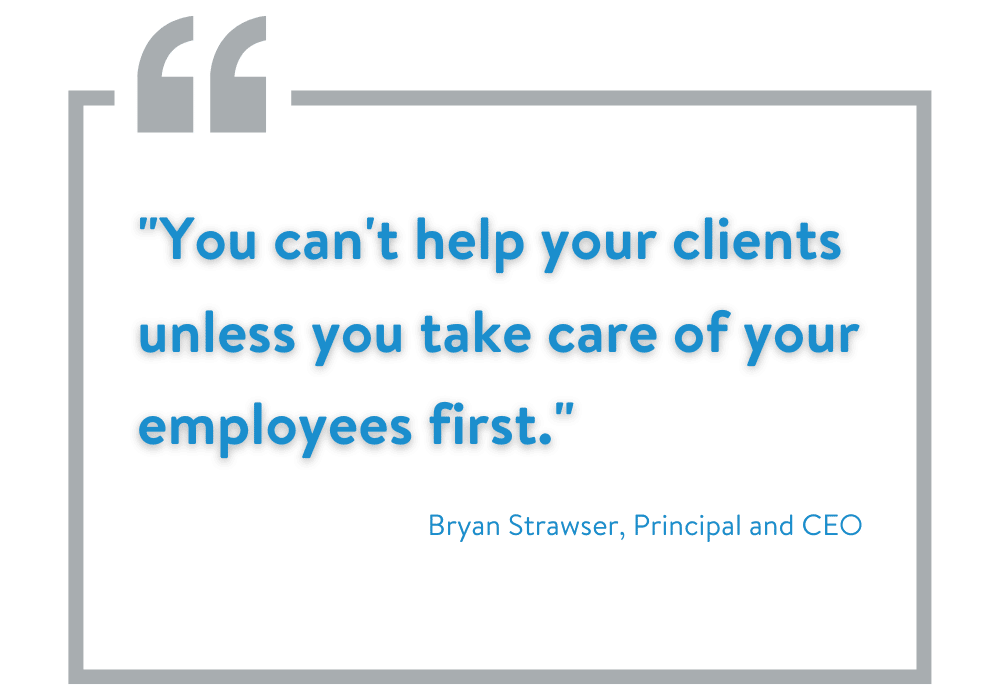Right now, I’m settling into my seat with the tray table secured and seat back in its full upright position. We’re headed to the land of mai tais and palm trees, and like a kid at Christmas, I look forward to a week of good books, bad dad jokes, and finding sand in crevices I didn’t even know existed (if you have kids, you know what I mean by this.)
Of course, the crisis management nerd in me also relishes the more mundane parts of vacation time, like philosophizing on the flight attendants’ safety briefing.
“In the event that the cabin loses pressure, ensure your mask is first in place, then secure the masks of minors and those around you.”
Self-help and parenting experts have long appropriated the “oxygen mask principle” to illustrate a simple point—you can’t take care of others if you don’t take care of yourself first.
I believe the same is true in business. You can’t help your clients (at least not very well) unless you take care of your employees first. This is especially true when navigating through a crisis.

Even the most perfect crisis response plan is worthless if you don’t have the people to execute it. That’s why it’s so essential to include Human Resources (HR) in your crisis management program. They are the lifeline, the yellow oxygen mask, to your organization’s most important crisis management tool—your employees.
Here’s our take on the importance of including HR in your crisis management program and how to do it well.
Crisis Management in a Nutshell
To understand the important role of HR in your crisis management program, it’s helpful to first have an understanding of what the crisis management team is, what it does, and the general roles and responsibilities of each team member.
What is crisis management?
The goal of crisis management is to anticipate and prepare your organization for disruption. This process includes:
- Selecting and training the crisis management team and crisis management team leader,
- Creating a crisis management framework & plan, and
- Conducting exercises to build confidence and improve your plan over time
What is a crisis management plan and why is it important?
A good crisis management plan can strengthen your organization’s response to a crisis by detailing the exact steps your business needs to take to deal with a catastrophic or adverse event.
Key elements should include:
- Defining your company’s critical functions
- Determining what the plan covers and how and when it will be activated
- Defining roles and responsibilities and chain of command
- Planning for how your plan will be exercised and debriefed
- A crisis communications and messaging strategy that sets forth clear communication channels and messaging for both internal and external communications during and after the crisis
- Key resources and information that should be readily accessible in a crisis, including contact lists, timelines, decision flow charts, disaster recovery plans
What are the roles and responsibilities of the crisis management team?
The crisis management team is a hand-picked cadre of leaders and subject matter experts who execute the crisis management program under the direction of the crisis team leader.
The crisis management team provides direction, support, and expertise in all phases of the crisis management program, including before, during, and after a crisis.
Prior to a disruption, crisis management team members are expected to participate in crisis management plan development and exercises. They help prepare their respective organizational components for potential disruptions.
During the crisis, crisis team members are responsible for providing updates to their respective areas of operations. They also inform the crisis management team and executive leaders at meetings and calls and provide feedback and advice to inform the crisis management team’s decision-making and the overall crisis response.
In the aftermath of the crisis, crisis management team members help ensure that critical business functions remain operating, facilities are secured, employees and operations are relocated if necessary, and that immediate needs for employee wellbeing and support are being met. The crisis management team also participates in after-action and lessons-learned processes to improve the organizations’ crisis response in the future.
Because the crisis management team acts as an important lifeline and communications channel before, during, and after the crisis. It should ideally include representatives from all key organizational components, including HR.
Want to learn more about Crisis Management?
Our Ultimate Guide to Crisis Management contains everything you need to know about crisis management.
You’ll learn what it is, why it’s important for your organization, how to prepare for a crisis, how to respond when a crisis happens, and how to recover and learn from a crisis after it is over. We’ll also provide some perspective on where to learn more about crisis management.
The Case for Including HR in Your Crisis Management Program
In almost every engagement that Bryghtpath undertakes with a client, we get this question:
“Does HR really need to be involved in the crisis management program?”
Heck yes! And here’s why.
People, not plans, are responsible for the actual “response” to a crisis. And because a crisis event can severely impact the personal lives of the people on your team, you need to make sure that your crisis management program is designed first to address the human element of your crisis response.
Consider an adverse weather event, like a tornado. Schools may be shuttered, leaving employees without childcare. Homes are demolished, leaving some of your people temporarily homeless. And let’s not forget the psychological trauma of responding to injuries, death, and life interrupted. These circumstances, especially where a prolonged or community-wide catastrophe is involved, can severely impact your employees’ mental health and ability to perform their day-to-day responsibilities at work.
The crux of the crisis management process is really about taking care of your team. During a crisis, they must first be assured of their basic safety and security before they can commit bandwidth to your organization’s crisis response. That means helping them navigate things like special benefits, scheduling adjustments, accessing state and federal aid, and getting help for both immediate and long-term physical and mental health needs.
If you want to exclude HR from the crisis management process, for whatever reason, you need to have someone on your team who can represent and fulfill this important capacity. I have yet to meet an organization in which HR, no matter how good, bad, or understaffed, are not the best ones to do so.
How to Include HR in the Crisis Management Program
In addition to the typical roles and responsibilities shared by every other member of the crisis management team, HR has a special role to play before, during, and after the crisis.
Here are some of the specific roles we define for HR when we’re building a crisis management framework & plan for our clients.
Before the Crisis:
- Prepares a plan to communicate with employees and retrieve important employee records when normal channels of communication may be interrupted
- Arranges contingency plans for payroll, benefits, and claims processing
- Helps the crisis management team understand how legal, compliance, and bargaining obligations impact the crisis planning process
- Develops plans to secure human capital and intellectual property in the face of an adverse event that could drive employees to competitors
During the Crisis:
- Ensures employee wellbeing issues are being addressed by providing quick access to employee data, such as next of kin, and employee assistance through various programs
- Supports employee relations and issue escalation
- In charge of crafting and distribution of emergency employee notifications
- Works with appropriate teams to coordinate a roll call to determine the whereabouts and status of employees, contractors, other workers, and visitors, and brief the crisis management team on status
- Proactively intervenes to assist with employee morale
- Together with line managers, monitors morale and advise the crisis management team on employee matters of concern
- Provides regular briefings to the family of a victim(s) on the progress of the incident and arranges the timing and content of such briefings
After the Crisis:
- Arranges the provision of appropriate assistance and welfare for impacted staff and families
- Ensures that crisis counseling and mental health service are accessible to employees
Putting the “Human” Back Into Crisis Management Planning
Putting people first isn’t just the right thing to do; it’s also good for business. This is not any less important than during a crisis.
But does your current crisis management program actually put people first?
If you’re leaving HR out of the mix, probably not.
Are you ready to put the “human” back into your crisis management program? Bryghtpath is ready to assist.
Our experts have built, implemented, and managed the crisis management strategies, plans, and processes used by the world’s leading brands. We’d love to talk with you about how you can leverage our experiences and knowledge to improve your organization’s resilience.
Want to work with us or learn more about Crisis Management?
- Our proprietary Resiliency Diagnosis process is the perfect way to advance your crisis management, business continuity, and crisis communications program. Our thorough standards-based review culminates in a full report, maturity model scoring, and a clear set of recommendations for improvement.
- Our Crisis Management services help you rapidly implement and mature your program to ensure your organization is prepared for what lies ahead.
- Our Ultimate Guide to Crisis Management contains everything you need to know about Crisis Management
- Our Free Crisis Management 101 Introductory Course may help you with an introduction to the world of crisis management – and help prepare your organization for the next major crisis situation.
- Learn about our Free Resources, including articles, a resource library, white papers, reports, free introductory courses, webinars, and more.
- Set up an initial call with us to chat further about how we might be able to work together


 Plan Your Ransomware Attack Response Now
Plan Your Ransomware Attack Response Now